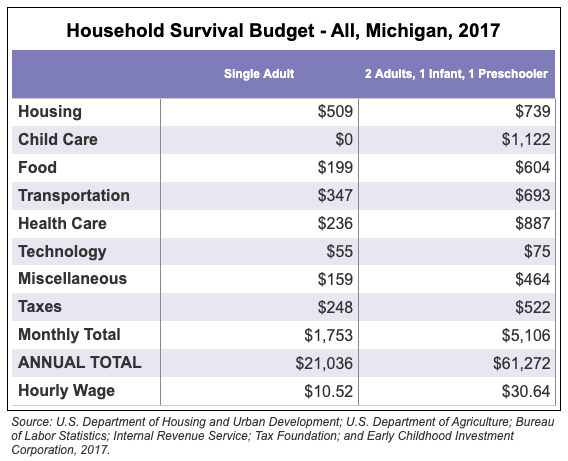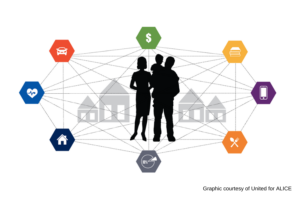ALICE is anyone who is Asset Limited, Income Constrained, & Employed. Many of us are ALICE.
ALICE is your waitress, your child’s educator, your hairdresser, and your cashier at your local grocery store. ALICE households live above the poverty line; therefore they do not qualify for many assistance programs, but they also struggle to manage and budget for basic needs. ALICE households cannot always pay the bills, have little to no savings, and are often one rainy day away from financial shock. In other words, they have just enough to not get behind, but not quite enough to get ahead.
“Many people think that because you’re working,
you have a fat bank account, but the reality is
we’re living paycheck to paycheck.” – Ms. J
Ms. J is an Islandview resident who recently received a new boiler through our Healthy Homes program. “We have other things we have to do. We don’t have the money for big expenses for things we also need, like boilers.”
Sound like someone (or many people) you know? That’s because in 2017, in Wayne County, Michigan, 39% of people lived below the ALICE Threshold in addition to the 35% of Wayne County residents who lived below the poverty line.(1)
What is the ALICE Threshold?
The ALICE Threshold is the “Household Survival Budget.” This budget only includes the bare minimum bare necessities and does not include savings. This leaves the household vulnerable to a big financial blow if they have to stray from their budget for any unforeseen expenses, and it leaves no room to save for their futures or the futures of their children.

With the cost of living increasing at a significantly higher rate than wages, the number of households below the ALICE Threshold increase throughout the year as well as households who move from ALICE to below the poverty line.
ALICE families are forced to make difficult and risky choices every day. The six fundamental categories of the Household Survival Budget are Food, Housing, Childcare and Education, Transportation, Health Care, Technology, and Taxes. One choice all too many people are familiar with is between paying the rent and feeding our families. This is a choice no one should ever have to make, and for the 40% of US households living below the ALICE threshold, this choice, and many other choices, have consequences that put their family’s health, safety, and financial well-being at immediate risk.
So why is it important to get to know ALICE, and what can we do to help?
 According to United for ALICE, “Traditional measures of poverty do not capture the magnitude of people who are struggling financially.”(1) It is essential to understand ALICE to inform policies and decision-making. By counting ALICE into the conversation, we can change the dialogue surrounding the needs and financial stability of our communities.
According to United for ALICE, “Traditional measures of poverty do not capture the magnitude of people who are struggling financially.”(1) It is essential to understand ALICE to inform policies and decision-making. By counting ALICE into the conversation, we can change the dialogue surrounding the needs and financial stability of our communities.
A common qualification for assistance is having a household income that is 200% of the poverty line or lower. That means a family of four with an annual household income of $50,000 in Detroit would not qualify for much-needed help. Using benchmarks like Area Median Income (AMI) can help more people qualify for the help they need just as much. Even scaling it back to 80% of AMI helps many more families qualify.
This is only one piece of the solution. The issues that ALICE households face are complex and intertwined, so an effective solution would have to be the same. A true solution will require innovation and cooperation from all stakeholders. The first step we can take as a community is to identify and recognize these households caught in limbo between poverty and financial stability and count them in when it comes to policy and decision making.
One thing you can do if you are living under the ALICE threshold:
Apply for assistance anyway! Ms. J explains, “A lot of people feel they are ‘taking advantage’ of resources if they are working, but…
…We need things too! We live in the district, and we have things we need too!”
Governing bodies, communities, and organizations are beginning to recognize the need that exists for the average household. Even if you end up not qualifying, you are a role in taking steps toward a solution for the ALICE community just by stating you could use some help. The more data there is on what household incomes still leave folks with gaps in their budgets, the more resources will become available over time.
1. https://www.unitedforalice.org/michigan
